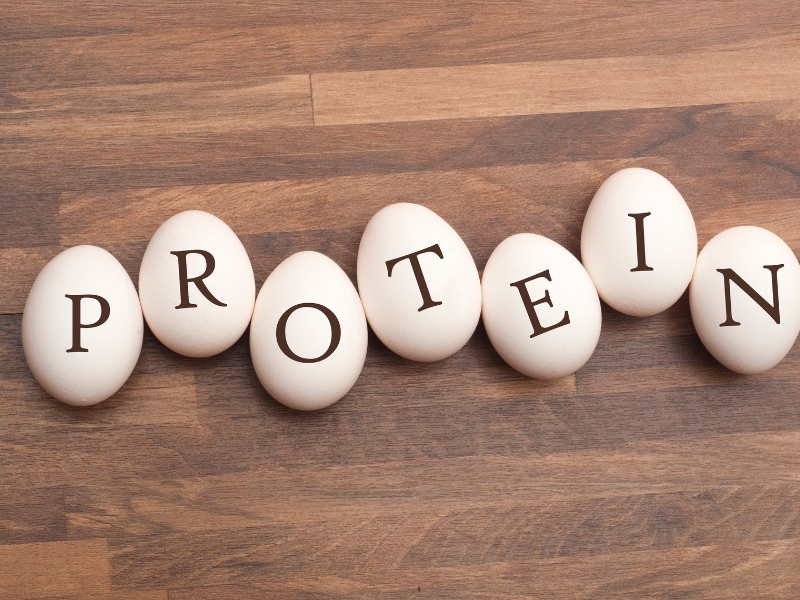
Nutrition plays a major role in the health and functioning of elderly individuals. Protein, especially, is linked with muscle health in seniors. Older adults can receive the recommended daily amount of protein through their diet. Caregivers and seniors should understand the importance of protein.
As seniors grow older, their bodies change. One of the key alterations is the reduction of total body protein. The most noticeable indicator of this change is a decrease in skeletal muscle. However, protein also plays an important role in all bodily tissues.
Protein is, in fact, the key building block of not only muscles, but skin, enzymes, and hormones. A senior who does not consume enough protein can experience a variety of health problems. Even low protein intake can cause subtle changes to the senior’s body over a period of time.
Older adults may be protein deficient when they consume an insufficient amount of protein, one that fails to meet the body’s requirements. While inadequate protein intake is more severe in underdeveloped countries, even people in the Western world can suffer.
People in developed countries who are most at risk for inadequate protein intake are those who follow an imbalanced diet, older adults living in institutions, and hospitalized patients. Symptoms of protein deficiency can start even when the deficiency is marginal.
1. Protein Retains Muscle Mass
Muscles retain the largest amount of protein. When a senior receives an insufficient intake of dietary protein, the body takes protein from the skeletal muscles. This action helps the body preserve more vital tissues and body functions. As a result, muscle wasting occurs over time.
The loss of muscle mass is one of the first signs of inadequate protein intake in the elderly. Especially in seniors, even moderate protein insufficiency can cause muscle wasting. Older people who consume the lowest amount of protein tend to experience the greatest muscle loss.
2. Protein Reduces Risk of Bone Fractures
A low protein intake affects other parts of the body as well, such as the bones. Without an ample supply of dietary protein, seniors are more at risk for weakened bones and subsequent bone fractures. An inadequate protein intake is linked with lower bone mineral density.
Protein, however, in sufficient amounts helps to maintain a senior’s bone density and strength. Studies show that a higher intake of protein is associated with a lower risk of hip fractures in postmenopausal women. Animal-source protein and protein supplements can slow bone loss significantly.
3. Protein Lessens Severity of Infections
The immune system suffers when seniors do not receive a sufficient amount of daily protein. Symptoms of severe protein deficiency include the increased risk or severity of infections. Older women who follow a low-protein diet are likely to experience impaired immune function.
An impaired immune response that is due to a low intake of protein makes it more difficult for elderly people to fight off infections. An aging adult who is protein deficient will struggle to battle even minor infections, such as the common cold.
4. Protein Reduces Appetite and Risk for Obesity
Severe protein deficiency causes seniors to experience a reduced appetite. However, even milder protein deficiency affects appetite. When a senior fails to consume enough protein, the body compensates by increasing his appetite, an effort designed to restore his protein status.
The senior is likely to reach for savory, high-calorie foods when his appetite increases. Savory foods tend to be high in protein. Plus, protein is more filling than carbs and fats. As a result of the poor protein diet, the older adult may experience weight gain and obesity.
Older people who consume the recommended dietary allowance of protein may still fall short. This shortfall is due to the fact that aging bodies might not be able to use protein efficiently. Protein needs also hike when inflammation from infections or other medical problems exist.
Chronic diseases, surgeries and injuries increase a senior’s need for protein. Chronic systemic inflammation, which many older adults suffer from, can raise the body’s protein requirements. Similarly, certain medications, such as steroids, can ramp up the body’s need for protein.
While the recommended dietary allowance for protein is 0.36 grams per pound of body weight, due to the above factors, seniors should receive up to 50 percent more. People over age 65 should try to consume 0.45 to 0.55 grams of protein per pound of body weight daily.
Seniors who live with chronic disease should incorporate even more protein into their diet—0.68 grams per pound. Spread the protein intake out, aiming for 25 to 30 grams of protein per meal, in order to experience the maximum benefits in the muscles.
The best sources of protein include seafood, poultry, meat, and dairy products. Protein is also plentiful in beans, nuts, lentils, seeds, soy, and whole grains. Animal-based protein contains all nine amino acids that the body needs. Include a variety of plant-based proteins to receive all nine essential amino acids.

Families who are unable to monitor an elderly loved one’s dietary intake of protein can trust the caregivers at Assisting Hands Home Care to provide this invaluable service. We ensure seniors eat a healthy, well-balanced diet and promote their overall physical health and emotional well-being.
Our professional caregivers shop for fresh foods and prepare nutritious meals that are rich in vitamins and minerals. Senior care services are especially beneficial for older adults who do not drive, who live with a disability or who need general support with the activities of daily living.
In addition, our home care agency caregivers provide timely medication reminders, transportation to doctors’ offices or senior centers and pleasant companionship. We perform light housekeeping and respectfully assist seniors with all personal hygiene tasks, such as bathing, grooming, and dressing.
Elder care from Assisting Hands Home Care is the best solution for the senior in your life. Our compassionate nonmedical care benefits care recipients and reassures families. Schedule an in-home consultation, and we’ll evaluate all care needs. Call us at (630) 526-6522 today and start quality home care.















